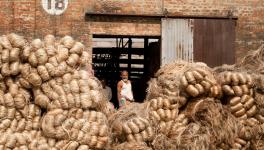Close to Lakh Workers Bear Brunt of ‘Reasonable’ Raw Jute Price Leading to Mill Closures in Bengal
Kolkata: Mohammed Nasim Ahmed, Mohammed Mustafa, Sumangal Singh, Bhola Karmakar and Panchanan Chowdhary – all unionised jute mill workers, who are also office-bearers of unit-level union -- are awaiting the day when their long wait for withdrawal of closure/suspension of work notices will end and jute mills will resume regular production.
The mill owners have cited financial distress as the reason for their decision for suspension/closure, but then they suddenly resume production for short duration and repeat this practice three-four times a year. The reasons cited often are periodic maintenance and “political compulsions” ascribable to ministers’ requests to avoid uncomfortable situations.
But, at the moment, the immediate reason for workers’ distress resulting from closure and suspension of work notices is the “reasonable” price, intended as the cap, of Rs 6,500 per quintal of raw jute (Kolkata landed price) fixed by the Jute Commissioner’s office (JCO) under the administrative control of the Union textiles ministry.
This price, notified on September 30, 2021, is to remain in force till the end the current jute year, that is, June 30, 2022 or further orders, whichever is earlier. However, the price has become a bone of contention between Indian Jute Mills Association (IJMA) and JCO. The role of the West Bengal government is that of a mediator and enforcer.
IJMA has contended before the authorities, both the Union government and Nabanna (state government), that jute has not been available to mills at Rs 6,500 even for a single day since JCO notified the “reasonable price”. A related point made by IJMA is that movement of raw jute to mills entails handling and transportation costs, which do not appear to have been factored in the price of Rs 6,500 by JCO.
Raw jute prices have ruled at Rs 7,200/quintal and even higher, at which level it is unviable to manufacture jute bags because JCO fixes the bag price with reference to raw jute price of Rs 6,500/quintal. This is why balers feel the need for clarity in respect of handling and transportation costs that has created some confusion.
Mills which had stocked raw jute before the price spurt and JCO’s September 30 notification (and managed some quantities even thereafter at higher prices) were able to continue bag manufacture. However, there are others who resorted to closure.
As per IJMA’s own admission, “more than five mills have downed shutters rendering about 12,000 workers jobless. By January-end more than 15 mills might close down affecting 50,000 workers.” This was pointed out by IJMA on December 29 in a letter to West Bengal chief minister Mamata Banerjee.
Thus, there are two categories of suffering workers; first, those in the mills that resorted to closure/suspension of work because of financial distress and second, those who have become victims after the raw jute issue surfaced.
In these circumstances, nine major unions led by Centre of Indian Trade Unions (CITU), including, among others, All-India Trade Union Congress and Indian National Trade Union Congress have sought the intervention of Union textiles minister Piyush Goyal and the chief minister.
Explaining how the workers’ miseries have been mounting, the trade unions have listed reasons, such as non-receipt of lockdown period wages, frequent closure, reduction of shifts, reducing daily complement of workforce and engaging contract labour -- all these at a time when essential commodities have been becoming dearer. With the fresh bout of closures and fear of work suspension, the number of jute mill workers out of employment might reach about a lakh.
The unions’ main demands are: payment of lay-off wages, payment of wages for the lockdown period, clearing statutory dues of retired workers, dehoarding drive to recover raw jute clandestinely stocked for profiteering, monopoly purchase of raw jute at remunerative prices by Jute Corporation of India (JCI) or its agencies and supplying the same to mills on cash payment basis. They have rejected the charge that farmers are hoarding raw jute in expectation of realising prices higher than Rs 7,200/quintal because farmers cannot hold on to stocks ; it is just beyond them.
At a meeting with industry representatives on December 13 last, Goyal defended the price of Rs 6,500 a quintal for raw jute and ruled out an upward revision. He even told mills that should they find it unviable to supply bags (B Twill) for packaging foodgrains at prices fixed by JCO, they may reduce supply.
This ‘loaded’ remark by the Union minister was interpreted by many as ‘pressure tactics’ and apathy toward the sufferings of workers under the prevailing circumstances.
The West Bengal government did hold some meetings in which law minister Moloy Ghatak, minister of state (independent charge) for labour Becharam Manna (of Singur fame), chief secretary Hari Krishna Dwivedi and other officials concerned were present. Nabanna was against fixing a selling price limit for any agricultural produce. It said JCI should go beyond minimum support price (MSP) and when circumstances warranted, it should undertake commercial purchases to stabilise the market. JCI argued that if it resorted to commercial purchases, prices might shoot up beyond control. It offered to buy up the dehoarded quantity at MSP. However, its argument against commercial purchases was not to the liking of the Nabanna brass.
For the upcoming 2022-23 jute year, the West Bengal government wanted JCO to develop a dynamic portal to track the entire jute supply chain from cultivation to supply to the jute mills to ensure that production of B Twill bags for foodgrain packaging was not thrown out of gear by raw jute hoarders and unauthorised players.
The state’s director general, Enforcement Branch, also urged JCO to provide the final list of registered raw jute stockists and traders to facilitate more anti-hoarding steps. Already, 13 prosecution cases have been lodged against errant traders.
Be that as it may, the fact remains that workers’ woes remain, much to the helplessness of Nasim Ahmed, Mustafa, Sumangal (he is CPM’s nominee for civic polls in the Serampore area in Hooghly district), Bhola and Panchanan. Thousands others have joined their ranks. At the moment, what is clear is that jute mill workers are staring at an uncertain future.
The writer is a Kolkata-based senior freelance journalist.
Get the latest reports & analysis with people's perspective on Protests, movements & deep analytical videos, discussions of the current affairs in your Telegram app. Subscribe to NewsClick's Telegram channel & get Real-Time updates on stories, as they get published on our website.























